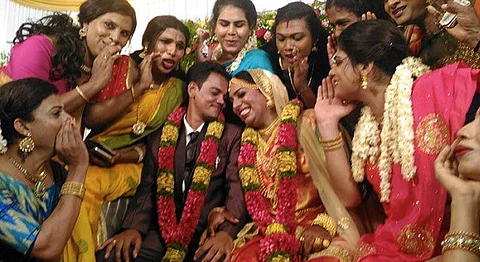
- HOMEGROWN WORLD
- #HGCREATORS
- #HGEXPLORE
- #HGVOICES
- #HGSHOP
- CAREERS
- ABOUT US
- CONTACT US

Adorning a traditional red saree with jewels around her neck, Surya the bride holds her palms together, thanking guests who blessed her lawfully wedded union with Ishaan, in a historic wedding with their presence. Beside Surya, her new husband Ishaan fails to control his joy.
In a first, Kerala witnessed a trans wedding under the Special Marriage Act (1954), of Ishaan and Surya who also belong to different religions. On a humid Thursday afternoon in Mannam Hall, Trivandrum, family members, friends, scores of trans-community members along with trans-activists and local politicians from around the state attended the wedding.
Ishaan and Surya are a part of Transgender Justice Board in Kerala, which was established in 2017 after questions were raised on the state’s integrity in being a socially developed role model for the country, more so with its astronomical literacy rates. The couple were dating for 6 years until they felt the time was right. Surya is a local TV anchor and Ishaan a member of Oasis, a self-help group for transgender people. This wedding marks a sweet victory for the marginalised and often humiliated transgender community who are finally beginning to find their much-deserved grounds.
Interestingly, the couple decided that no religious rituals be involved in their ceremony. Ishaan, a Muslim, and Surya, a Hindu, chose against the idea.
In a 2014 ruling by the Supreme Court of India which recognised a third gender demanded a fair opportunity for development. The ruling by the Apex Court maintains “the spirit of constitution which is to provide an equal opportunity to every citizen of the country to grow and attain their potential, (this is important) irrespective of caste, religion or gender.”
The history of the community has been somewhat confusing, for many. For starters, the community finds high mentions in the epics of Ramayana and Mahabharata, holding great positions in the courts of medieval India. It was not until the barbaric British’s Criminal Tribes Act of 1871 which denounced them to the status of “criminals” with “serious afflictions” which included wearing clothes other than their own sex’s. Many were arrested on trivial grounds such as dancing in the streets, playing music in public places, and a little unsurprisingly so, for indulging in gay sex.
